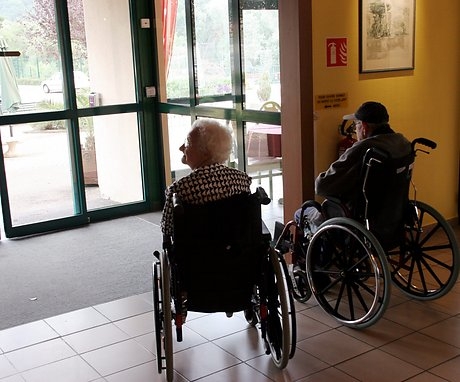Scotland short of Parkinson’s specialist nurses, warns charity

A charity has called for more specialist nurses to support the growing population of people living with Parkinson’s in Scotland.
Parkinson’s UK Scotland published a report earlier this month, in which it said highlighted that the country already lacks sufficient Parkinson’s nurses.
“We are really concerned that people are struggling to get the support they need from their nurse”
Tanith Muller
But growing demand from an increasing number of patients with the neurological condition meant a “double crisis” lay ahead, the charity warned in its report Scotland Can’t Wait.
According to the report, about 13,000 people in Scotland have Parkinson’s disease and more than 30 are newly diagnosed each week.
It said that, while the number of people with Parkinson’s was growing, more than half of Parkinson’s nurses currently working in Scotland were due to retire before 2030.
There were also shortages of other essential members of Parkinson’s teams, including doctors, physiotherapists, speech therapists and occupational therapists, it noted.
On the question of how many nurses were needed, the charity said it recommended that each full-time specialist nurse should have a maximum of 300 patients that they are responsible for.
However, Parkinson’s UK Scotland highlighted that nurses working in remote areas of the country should have even fewer patients.
As a result, it calculated that this meant Scotland needed a minimum of 44 full-time Parkinson’s nurses, when there were currently fewer than 33.
A typical Parkinson’s nurse in Scotland has about 100 more patients than they should, according to the charity.
It called on all NHS boards should review their Parkinson’s nurse caseloads, and plan for future increases in the number of people with Parkinson’s.
Parkinson’s UK Scotland spotlighted three boards where it felt workload reviews should be a particular priority, namely NHS Highland, NHS Lanarkshire and NHS Shetland.
In addition, it recommended that all NHS Boards should have robust succession plans in place as Parkinson’s nurses approach retirement age.
The report also stated that people with the condition told the charity that the “most important person helping them to live with their condition is their Parkinson’s nurse”.
Tanith Muller, parliamentary and campaigns manager for Parkinson’s UK in Scotland, said: “We are really concerned that people are struggling to get the support they need from their nurse right now.
“And these pressures will only get worse as the number of people living with Parkinson’s in Scotland continues to grow,” she said.
Dr Anne-Louise Cunnington, a consultant in older people’s medicine based at Glasgow Royal Infirmary, described specialist nurses as a “lifeline” for people with Parkinson’s.
“They are the link between primary care, hospital-based care and very specialist care, as well as social carers and the third sector,” she said.
She added: “Parkinson’s nurses act as the advocate for patients and their carers throughout their whole journey.”






